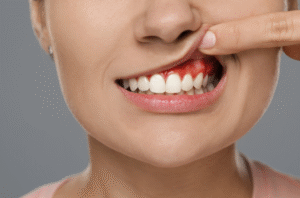Periodontics is a field of dentistry offered at Abbey Mead Dental & Implant Clinic, concerned with the prevention, diagnosis, and treatment of periodontal disease, known as gum disease, a Periodontitis.
Dr Vivek Giddani has a special interest in Periodontics after completing a post-graduate diploma in Periodontology at Peninsula Dental School in Plymouth.



Periodontics is a field of dentistry offered at Abbey Mead Dental & Implant Clinic, concerned with the prevention, diagnosis, and treatment of periodontal disease, known as gum disease.
Dr Vivek Giddani has a special interest in Periodontics after completing a post-graduate diploma in Periodontology at Peninsula Dental School in Plymouth.
Gingivitis only affects the gums and it is completely reversible. It occurs when tooth cleaning is not thorough enough, the bacterial deposits build up next to the gums, forming a plaque, and the conditions become suitable for more dangerous bacteria to flourish. The natural defences of the body are also compromised and the gum surrounding the tooth becomes red, swollen and inflamed. Left untreated, gingivitis may progress to periodontitis, often without any obvious signs to alert you.
Periodontitis is a more serious and advanced form of the disease. It can cause inflammation of the gums, but it also causes the breakdown and loss of bone and gum around the tooth. Bone loss due to gum disease is irreversible. If periodontitis is left untreated, the teeth may become loose which could eventually lead to their loss.
The most obvious signs of gum disease are:

The development of gingivitis and periodontitis can be prevented by adopting thorough oral hygiene habits. Alongside regular professional examinations and support.
Periodontitis can be inherited from one’s parents so the condition can run in families. Many studies have shown that gum disease is far more common and destructive in smokers. Similarly, diabetes will exaggerate the destructive response to plaque. Other conditions that exacerbate the symptoms of periodontal disease include pregnancy hormones, stress and some medications.
The type of treatment you’ll have will depend on how severe your gum disease is. Your dentist may refer you for treatment with a dental hygienist or a specialist periodontist.
The aim of periodontal treatment is to stop the inflammation of your gums and ensure the thorough removal of plaque and calculus deposits from all your tooth and root surfaces.
Once these deposits are removed, and are maintained, the cause of the gum reaction can be eliminated, and the destructive inflammation controlled. Providing the tooth surface is kept clean and free of plaque, the gums will return to a healthy, non-swollen, non-inflamed state.
The most important aspect of treatment for gum disease is an improvement in oral hygiene. Your dentist or hygienist will advise you on methods and techniques that are suitable for you.
If you or your family have a history of gum disease it is important that you mention this to your dentist on your first consultation and seek a thorough assessment of your gum health.
At Abbey Mead Dental & Implant Clinic, our dentists, and dental hygienists will be able to assess your susceptibility to gum disease. They then will provide the appropriate treatment, tailored for your specific treatment needs and the best course of action for you.
We are now offering an Advanced Dentistry Referral Service from dental colleagues or from patients themselves for complex periodontal cases.
We aim to see patients within 7 days of receiving the referral. Please contact us for further details.
Back to Treatments